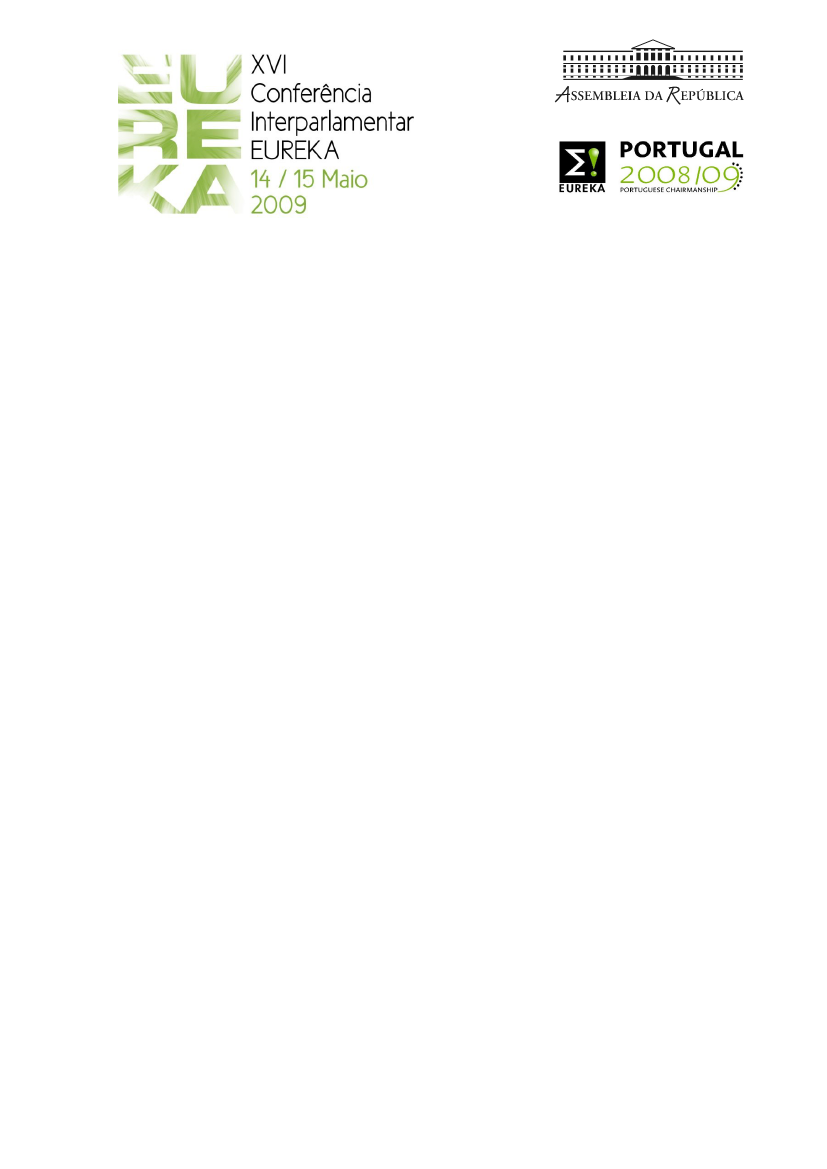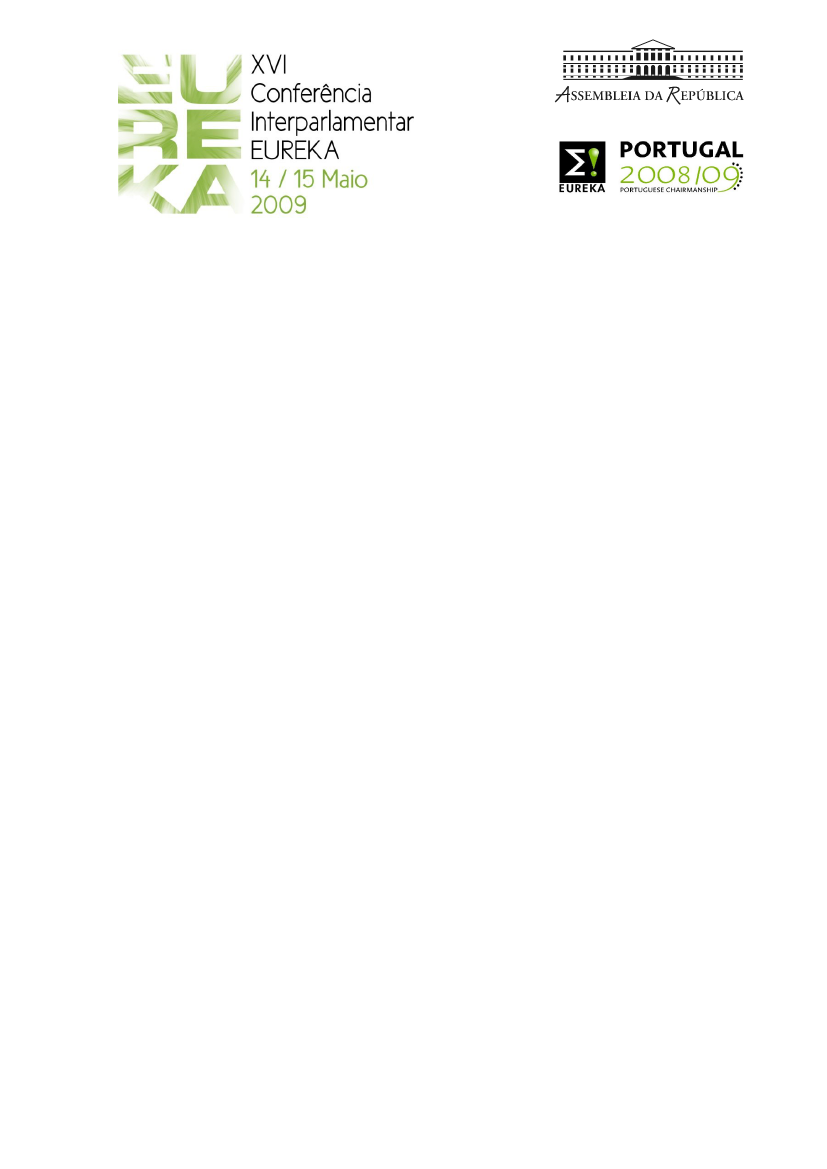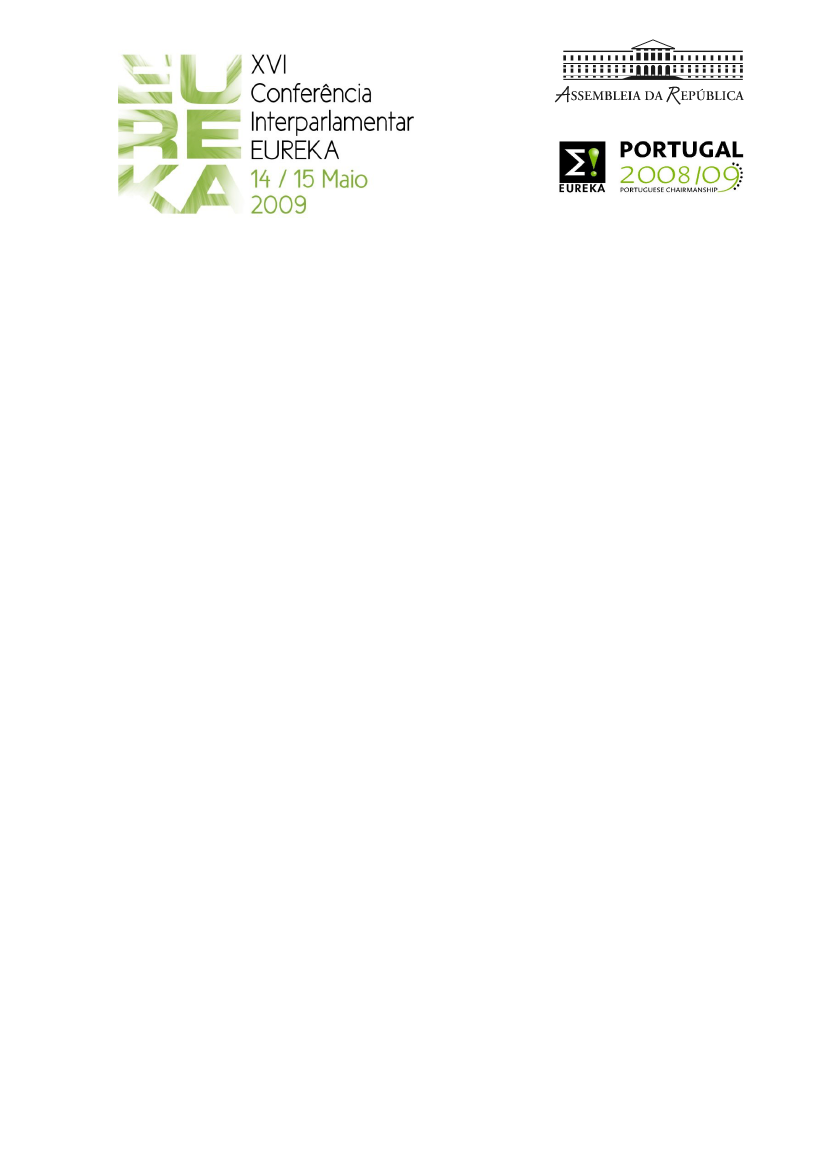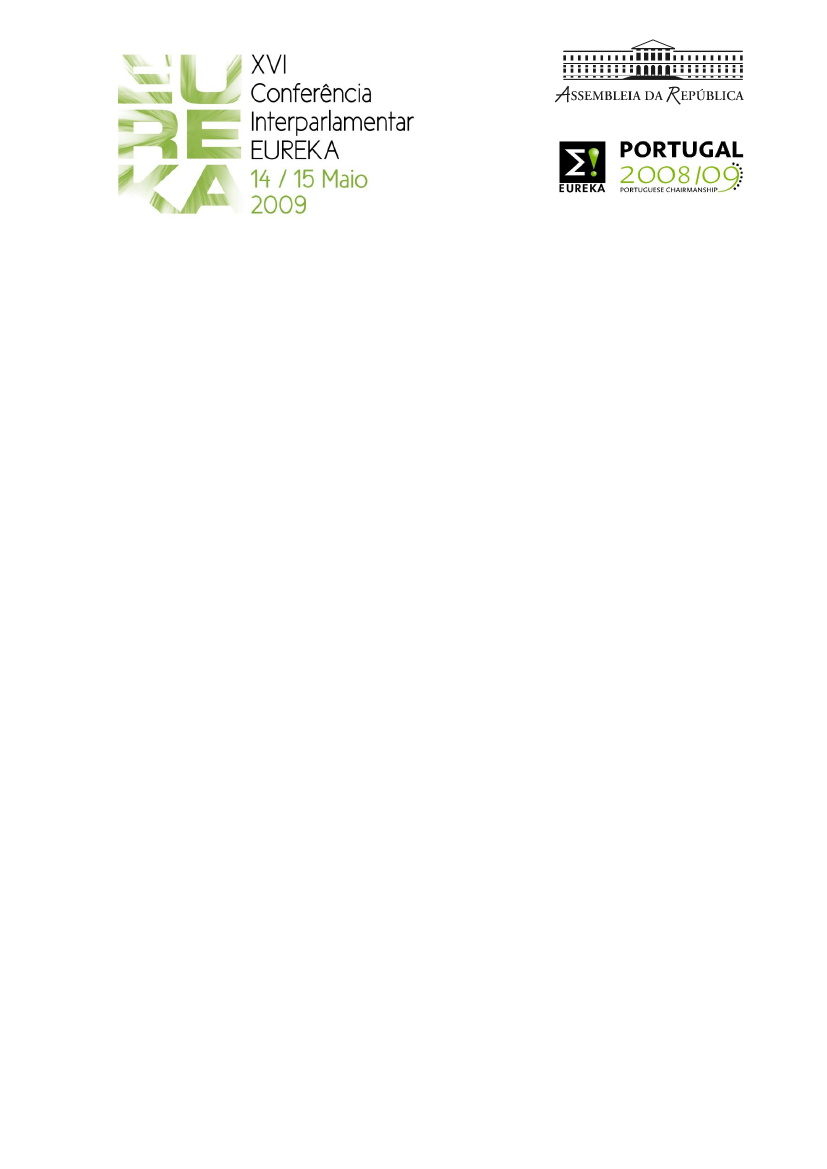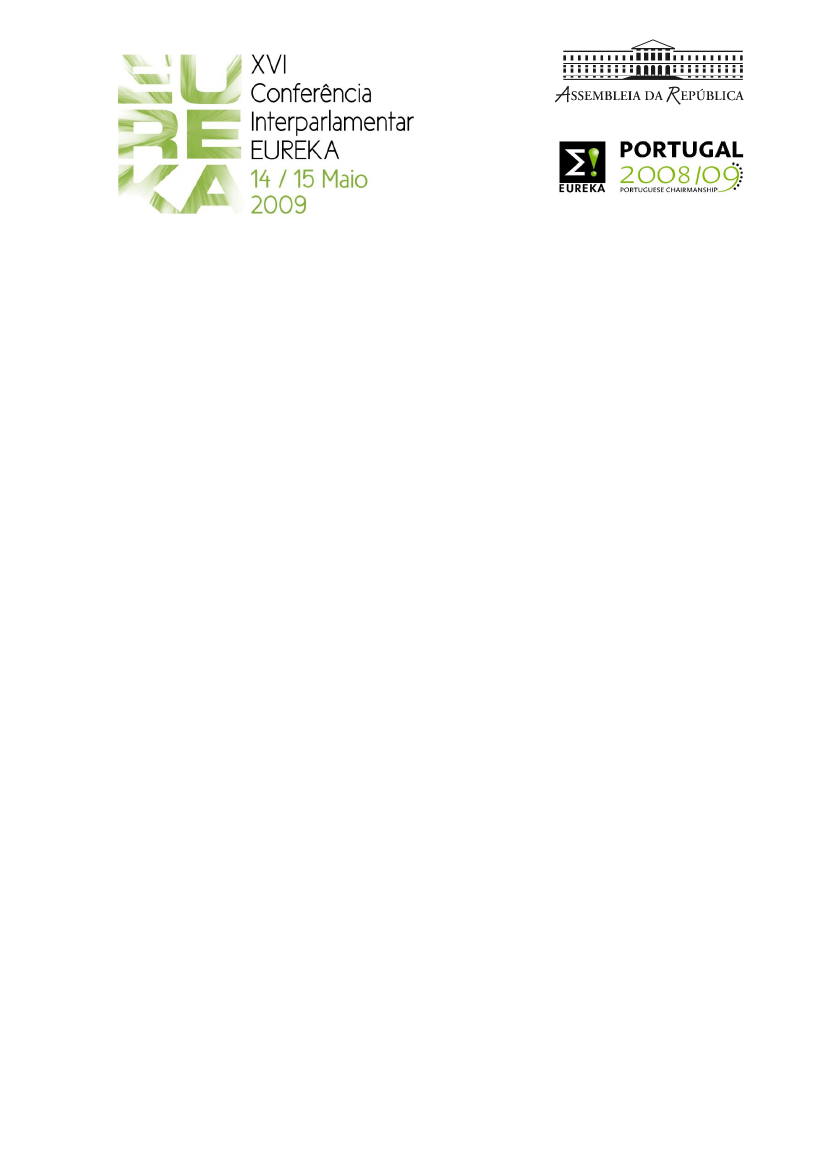Udvalget for Videnskab og Teknologi 2008-09
UVT Alm.del Bilag 160
Offentligt
RESOLUTION
OF THE 16th INTERPARLIAMENTARY EUREKA CONFERENCE
ASSEMBLY OF THE REPUBLIC OF PORTUGAL
LISBON, 14 and 15 May 2009
1. Introduction
On the initiative of the Assembly of the Republic of Portugal, the 16thInterparliamentary EUREKA Conference was held on 14 and 15 May 2009. TheConference was entitled “Energy and Sustainability”, and counted on theparticipation of Members of Parliament and Representatives of theGovernments of the EUREKA Initiative member states.The Conference was opened by Jaime Gama, President of the Assembly of theRepublic, José Mariano Gago, Minister of Science, Technology and HigherEducation of Portugal, and Bravo Nico, Member of Parliament and Chair of theConference.The Interparliamentary Conference lasted two days and counted on thepresence of speakers from Portugal and other member countries of the Eurekanetwork.2. The EUREKA Initiative
Since 1985, the EUREKA Initiative has been seeking to stimulate productivityand competitiveness in European industry, through transnational partnershipsin high-potential clusters. With strong involvement by the public and privatesectors, a fundamental role on the part of small and medium enterprises andthe support of national and European political institutions, the EUREKAInitiative has contributed in a significant way to the consolidation of a strategyof human, social and economic development in which knowledge, innovationand technology are the structural frameworks.1In the last 24 years, the EUREKA Initiative has contributed to the strengtheningof the symbiosis between scientific, innovation and production activities andthe transfer of technology to the global market in the European Union and inEurope itself.
3.EUREKA: the reality and the future
At the time the 16th Interparliamentary EUREKA Conference is being held,Europe and the world are going through one of the hardest financial, economicand social situations.Never before have we seen such an extreme need for a profound change in theparadigm of the structural matrix of development models currently in use inEurope and the world.In reality, the need to ensure compatibility between sustainability in economicdevelopment shows us that the European development model – strengthenedand legitimised by the definition of the Lisbon Strategy, signed in 2000 duringthe Portuguese Presidency of the European Union – is one of the most suitableanswers to both new and global challenges which humankind faces and it is ourobligation to use our resources efficiently and effectively.Therefore, the Interparliamentary Conference recognises the need toconsolidate and strengthen investment in Research, Innovation andDevelopment, with the strong belief that these will be the basic pillars of thefuture paradigm of economic, social and human development. In this context,the EUREKA Initiative – with the involvement from both public and privatesectors and with the interesting experiences that has shown in different areas –may provide a serious contribution to the creation of this new developmentmodel, through transnational collaboration in technology partnerships.In this context, we propose:The intensification of the financial support, by the member states, forthe EUREKA projects in their countries.
2
To suggest to the EUREKA Initiative member states to develop post-graduate studies in innovation management to strengthen theEuropean-based ability to build and coordinate transnational networks.To encourage the EUREKA Initiative member states to develop newinstruments to stimulate the market for venture capital societies.The investment in Science, Innovation and Technology, renewed with theadoption of a new cycle for the Lisbon Strategy (2008/2010), which increasesthe investment in innovation, as well as in research and development, must beincluded on the EU external agenda for competitiveness and must be continuedafter 2010.The Conference invites EUREKA parliaments and governments to take allappropriate measures in order to facilitate an improved and preferential accessto public support for EUREKA projects, as well as to make available thenecessary human resources within National Project Offices.
4. The strengthening of the transnational technology and the public-private
partnership
With the belief that the experience of the EUREKA Initiative could be a goodcontribution to the achievement of the objectives of the Lisbon Strategy and forthe creation of an extended European and world space where economicdevelopment will create wealth and coexist with quantitative and qualitativestandards, essential when exercising the most basic rights of citizens, it isfundamental that the essential elements of the EUREKA Initiative beconsolidated.In current circumstances, there is an opportunity for greater coordination andsymbiosis between the policies promoting transnational scientific research,innovation and technological development and the policies and instruments tostimulate economic and social development.Within this framework, the recent creation of the European Institute ofInnovation and Technology (EIT) represents an opportunity to reinforce this axis3
of intervention, considering the respective institutional ‘architecture’ and theobjectives based on which it was created.Indeed, today it is fundamental to design policies and monitoring instrumentswhich are coherent and complementary in all levels of intervention, so as topromote synergies through an appropriate management of the resources whichare currently available for development. This implies, without prejudice to theobvious reservation of national decision by each of the countries, the need topromote deep international dialogue, in suitable formal institutions, so as tobring about true cooperation between the countries, in which knowledge,innovation and technology form the basis of the dialogue and multiculturalunderstandings. This is also one of the matters and areas of learning which theEUREKA Initiative makes available.The Conference encourages interested members to consolidate the idea of aEUREKA Observatory that provides continuous evaluation of projects andcontributes for their adequate portfolio analysis and impact assessment.
5. EUREKA and the relationship between Europe and the World
The 16th Interparliamentary Conference believes it is essential to promote andextend partnerships between countries in the EUREKA Initiative and othercountries, so as to optimise international cooperation for mutual benefit.Therefore, we highlight the cooperation between innovation networks incountries from different regions of the world.6. The role of the European institutions in the development of the EUREKA
Initiative
The Members of Parliament participating in the 16th InterparliamentaryEUREKA Conference invite the European Commission, the Council and theEuropean Parliament, as well as national parliaments and governments to workin close cooperation with the EUREKA Initiative, strengthening the Europeanand international dimensions of projects which promote symbiosis betweenresearch, innovation and business and industrial activities.4In this context, the 16th Interparliamentary Conference invites the EuropeanCommission and the member countries of the EUREKA network to continue thework of the successful Eurostars Programme and, in parallel, to strengthen theEuropean dimension of national programmes that support all Eureka projects.
7. Next Interparliamentary EUREKA Conference
The Conference took notice of the invitation of the Head of the Science andTechnology Committee of the Knesset addressed to the Parliaments of allEUREKA Initiative member states to participate in the next InterparliamentaryEUREKA Conference that will be held in Jerusalem during the IsraeliChairmanship.8. Dissemination of the Resolution adopted by the 16th Interparliamentary
EUREKA Conference
Participants in the 16th Interparliamentary EUREKA Conference have requestedthat the Chair of the Conference make national and European institutionsaware of these recommendations, as well as the Ministerial Conference whichwill be held in Lisbon, on 19 June 2009.Lisbon, 15 May 2009
5
